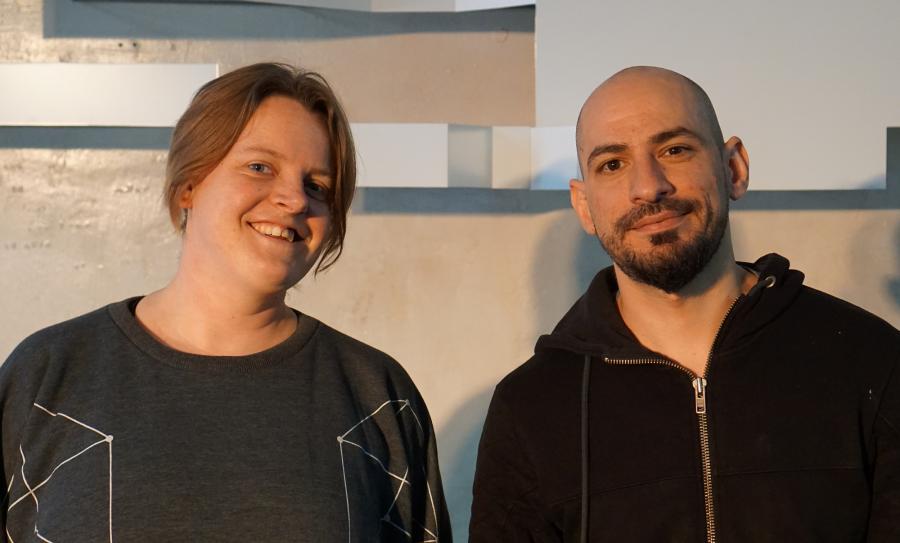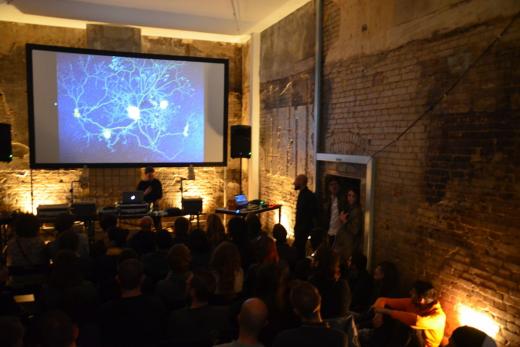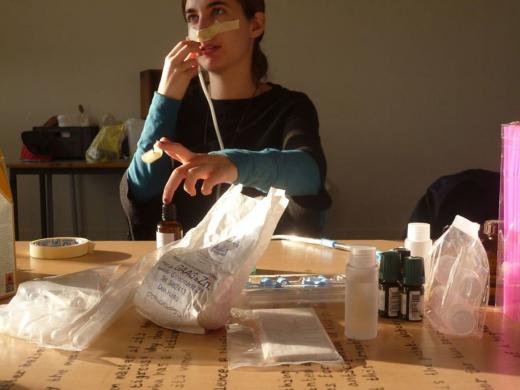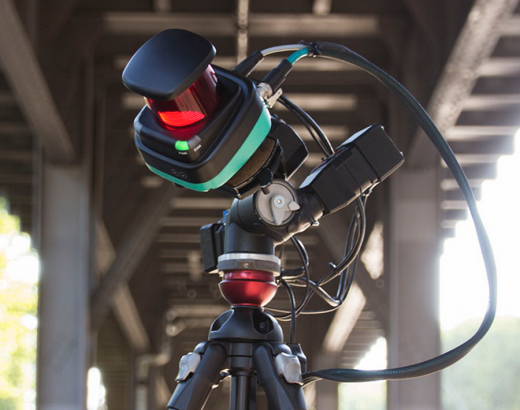Have you met... SPEKTRUM
Have you met... SPEKTRUM

The geeky side of the Berlin art scene is recently ruled by SPEKTRUM. For the past ten months, SPEKTRUM has been hosting a rich program of exhibitions, performances, screenings, concerts and workshops, in a spacious corner of a modernist building in Kreuzkölln. Those with a penchant for experimental, technology-based art, art science and / or hacking, have finally found a spot to explore their interests and share creative work with the likeminded folks.
We met up with the founders – Alfredo Ciannameo & Lieke Ploeger – to find out what this unique project space is all about.
How did you and Alfredo get together and decided to set up this project space?
We met quite some time ago in the Netherlands. Alfredo was studying at the Artscience Interfaculty of the Royal Academy of Art in The Hague, and I saw his final exhibition there. He moved to Berlin first, and a year later I decided to move here too. We always wanted to start a project together: we have quite different skills – Alfredo is a media artist, and I work in community building - and we thought it would be interesting to combine those two. We originally had a smaller project in mind, but once we discovered this space it grew into something bigger. When we saw the backroom, which is now the event room, our concept evolved into what Spektrum is today. Because it's a very visible corner spot, and the characteristics of the space were perfect, we decided to do a larger-scale art and community program.

What is the curatorial strategy here? How do you develop the program and choose the artists to work with? What kind of art are you mainly interested in?
Alfredo takes care of the curation of the art program, including the exhibitions, while I do more of the community work and certain events related to hacking, activism and open knowledge. We organise a wide variety of events, such as experimental film screenings, audiovisual, sonic and dance performances, with a focus on transdisciplinary approaches and technology-based art.
An important part of our program are the communities. Every Tuesday we have community meetings where people from different backgrounds (artists, designers, hackers, scientists, but also anyone who is interested) meet up to discuss and experiment around a certain topic. For example, we have the Live Cinema Lab, which is like a jam session of audio and visual artists, the RoboLab researching robotics and the movLab focused on motion technology. Our communities not only discuss and research a certain topic, but also develop some output around it. This can be an installation, a performance night or something else: it helps the community to have a focus to work towards, but also serves to show what they have been working on to a wider audience. Part of the future work of our communities will be to develop artworks in-house through our makerlab.
In addition, we actively seek collaborations with other realities in Berlin and abroad, such as with the Disruption Network Lab, the School of Machines, Making & Make-Believe or the FIBER festival from Amsterdam.
So you are quite open to collaboration and your program is also partly built with the input from your collaborators.
Through the communities, there is always room for people to give us input and get involved. We like to be an open space for people to be able to participate in. In a time where contact between people happens increasingly online through social media, we still strongly believe in the power of connecting different groups of people in a physical space, where they can meet face-to-face to experiment, share knowledge, share ideas and start up collaborations.

Smell Lab @ SPEKTRUM
When did you open the space?
In June 2015, after an intense 10-month period of renovation
So far, how was the response from the public?
It has been pretty good. We actually opened at the time when most people were going on holiday and cultural life slowed down a bit in the city. We started with a relatively full program all summer, which attracted quite a large audience. Also, our communities have been successful and people are enjoying the meetups. The Smell Lab for example was an idea that came up just before the opening, and it grew into an active group of around 20 people researching the role of smell in art. It's been really great to see all these communities flourishing in Spektrum. We also had a couple of exhibitions in autumn which attracted a big audience, and the Geek Market last December.
Was there a show in Spektrum that was the absolute highlight for you?
One of the highlights was the exhibition Human ♥ Robot in September, where we had some humanoid robots from TU Berlin demonstrating their skills. Another highlight was our participation in Vorspiel 2016, the transmediale / CTM pre-festival. We had an amazing evening on 'Verifying Art and Science', with renowned artscientists Evelina Domnitch, Dmitry Gelfand and Theresa Schubert and a great weekend together with FIBER and Retune festival. It was also the first time that our communities really showed their output in a series of showcase events. We had, for example, the Smell Lab presenting their installation, „Collected Smells“: an installation consisting of large fabrics with the smells of Neukölln they collected in their „smell walk“. Finally, the Sound Portraits series that Doron Sadja started up in SPEKTRUM last summer has turned out to be quite a success: people really enjoy to engage in a group listening session focused on the work of a certain composer on Sunday evenings.

Ingo Randolf, "Urban Needle" (Exhibition #2: Human ♥ Robot @ SPEKTRUM)
Can you tell us something about the Maker Space?
The makerlab will be our main focus in the coming months. We have a maker community called MadeByUs, which is leading on starting up our makerlab: a space with tools for digital fabrication like 3D printers, laser cutters, and electronics that will help our communities to start creating their own artworks for exhibiting. We plan to build the machines from open source kits and build the lab together through a process of co-production and joint learning.
What else are you currently planning at Spektrum?
We will continue to build up our program, develop our communities further and organise new exhibitions. We have a very exciting exhibition planned for June called „States of Matter“. This will be an artscience-focused exhibition addressing states of matter in different forms and through different media. We're really looking forward to that.
Spektrum / Bürknerstr. 12, 10967 Berlin, U Schönleinstr. / more info
* * * * *